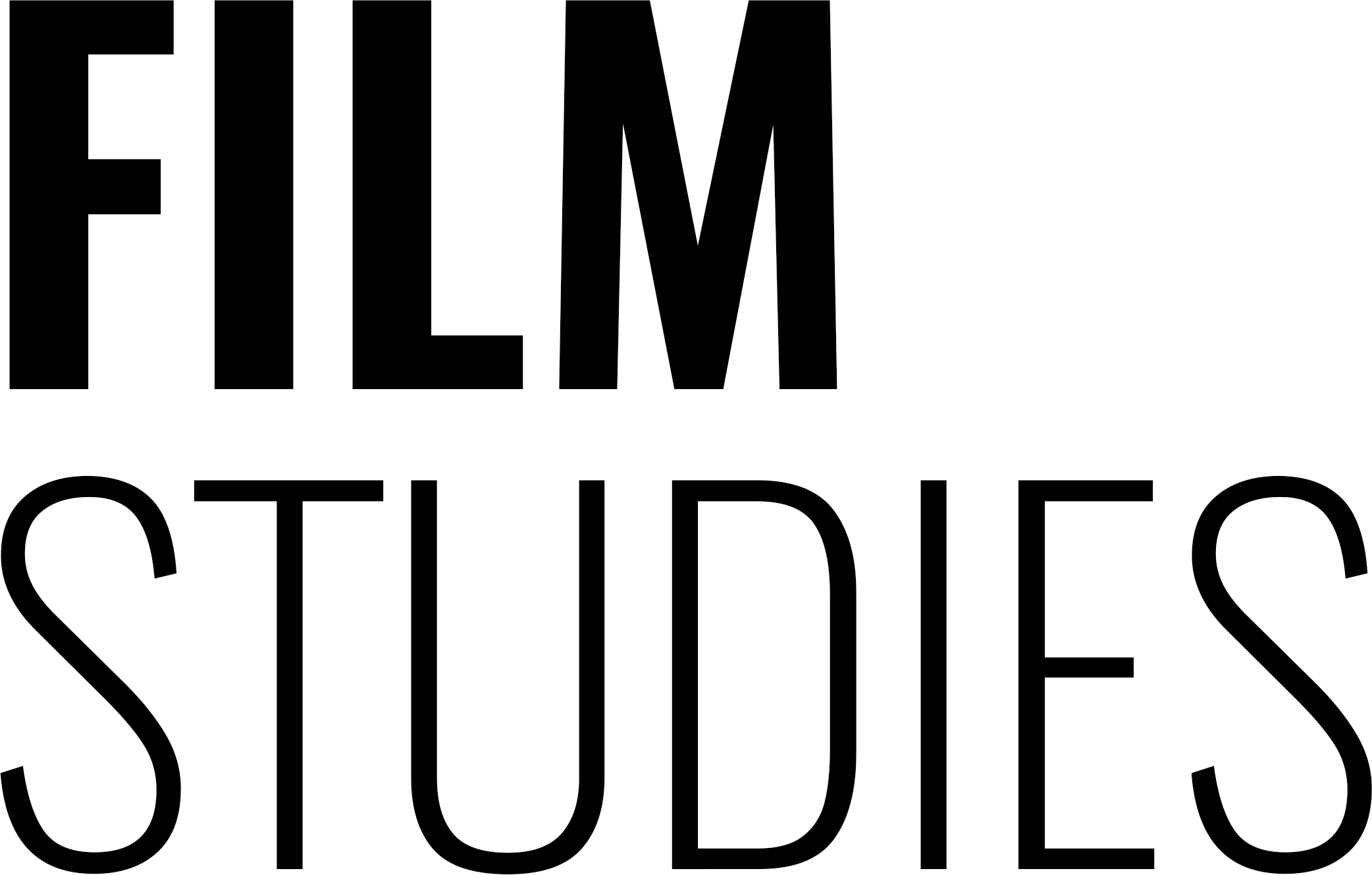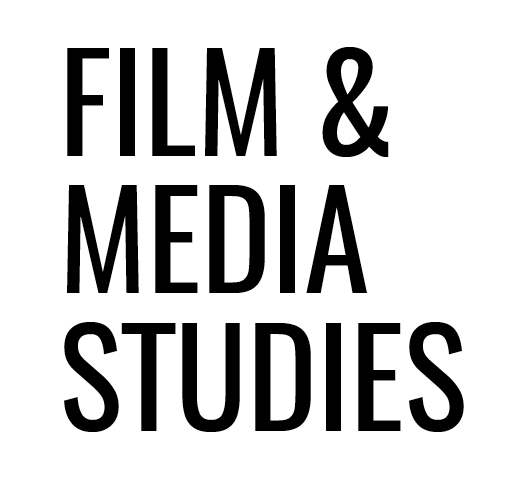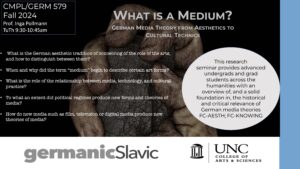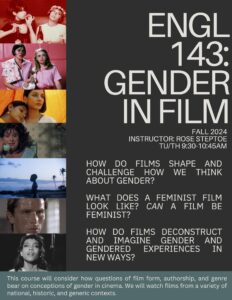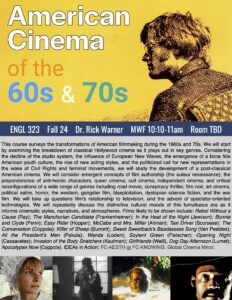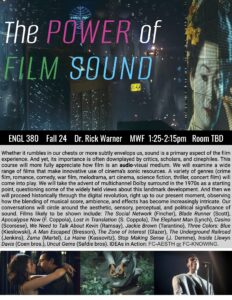Fall 2024 Course List
Any course on this list may count as an elective for the Global Cinema Minor or the Film Studies concentration in English and Comparative Literature. Some of these courses, however, will not automatically count, and in those cases you will need to request a Tar Heel Tracker adjustment.
Also keep in mind that some restrictions may apply to production courses. Be sure to check Connect Carolina for specifications by the department offering the course.
For those following the Film Studies Concentration
Foundations
ENGL 142 Film Analysis (Flaxman)
Survey II
CMPL 142 Visual Culture II (Flaxman)
ENGL 323 American Cinema of the 1970s (Warner)
ENGL 380 Film History: The Power of Film Sound (Warner)
Depth
CMPL 280 Film Genres: Film Noir (Veggian)
CMPL 280 Film Genres: Science Fiction (Berland), this section will be added soon to Connect Carolina
Writing-Intensive
CMPL 382 Film and Nature (Legassie)
ENGL 323 American Cinema of the 1970s (Warner)
ENGL 380 Film History: The Power of Film Sound (Warner)
Research-Intensive
CMPL 479 What is a Medium? German Media Theory from Aesthetics to Cultural Techniques (Pollmann)
First Year Seminars
ASIA 74: FYS: Imagining Palestine
Instructor: Nadia Yaqub
MoWeFr 2:30 – 3:20 PM
This course explores the idea of Palestine as in Palestinian creative works. We will study what Palestine is for Palestinians, how Palestinian relationships to and expectations of Palestine have changed over time; and how Palestinian portrayals of their homeland have affected perceptions of Palestine/Israel and the Arab world. How have art, film, and literature shaped Palestinian identities and aspirations throughout modern Palestinian history? How have they contributed to personal agency?
ENGL 57: FYS: Future Perfect: Science Fictions and Social Form
Instructor: Matthew Taylor
TuTh 11:00 – 12:15
This class will investigate the forms and cultural functions of science fiction using films, books, and computer-based fictional spaces (Internet, video games, etc).
GSLL 83: FYS: We, Robots: Identifying with our Automated Others in Fiction and Film
Instructor: Eliza Rose
TuTh 3:30 – 4:45 PM
The word “robot” was invented by Czech author Karel Capek in 1920. Science fiction has had a long-running obsession with robots. Fiction and film dream up robots who have mastered and often surpassed the strange art that is being human. In this class, we will read and watch stories about robots from East and Central Europe, with occasional detours into American culture. Films with English subtitles; readings and discussions in English.
MUSC 63: FYS: Music on Stage and Screen
Instructor: Anna Gatdula
TuTh 9:30 – 10:45 AM
Offers tools and techniques for understanding multimedia, staged musical works like opera, musical theater, and film. The goal of the seminar is to develop students’ analytical skills in verbal and nonverbal media and to encourage their visualization of the potential and implications of artistic forms and structures.
English and Comparative Literature
CMPL 142 Visual Culture II
Instructor: Gregory Flaxman
MoWeFr 12:20-1:10PM
Fulfills a major core requirement. This course surveys the visual arts, in particular painting and photography, from roughly 1750 to the present. Pictorial traditions, styles, and genres (as well as the traditions of critical writing that respond to them) will be considered from a proto-cinematic perspective. Theater and the novel may also be examined comparatively.
CMPL 220H: Global Authors: Jane Austen
Instructor: Inger Brodey
TuTh 9:30 – 10:45 AM
This course will focus on the fiction of Jane Austen, who wrote her letters and novels in the English countryside at the turn of the nineteenth century. Until the last few decades, Austen’s deep interaction with the literature, philosophy, and world events of her time were not fully appreciated. This course explores her relation to the age of war and revolution in which she lived, including the American Revolution, the French Revolution, the Napoleonic wars, and the War of 1812. In honor of the 250th anniversary of Austen’s birth in 2025, and the 250th anniversary of the Declaration of Independence in 2026, this course will look at Austen’s writing as exemplifying revolutionary thought and in relation to the establishment of civil society.
In addition, we will explore the role of her novels in twentieth- and twenty-first-century Asian nation-making and post-colonial statehood–particularly the role of TV and film adaptations of Austen’s work in Japan, China, South Korea, and India. We will discover some of the roots of Austen’s enormous literary and cultural influence across the globe. We will also pay close attention to the thematic and cultural content of her novels and the difficulties of translation across culture or across medium.
In addition to reading Austen’s novels, we will read other texts related to Austen and her historical context as well as to her adaptations. Students will have the opportunity to engage in original research via a new digital project for the public, sponsored by the National Endowment for the Humanities: Jane Austen’s Desk, forthcoming at www.janeaustensdesk.org.
Students will have the opportunity to write a screenplay, enter a national essay contest, and attempt to publish original research on Jane Austen. Students will also have the option of presenting a paper at the June 2025 or June 2026 Jane Austen Summer Program to be held in Carrboro and Chapel Hill.
CMPL 227: Global Authors: The Middle Ages in World Cinema
Instructor: TBA
Time: TBA
Traces major points of convergence among the thematic concerns of medieval literature, global cinema, and academic constructions of “the Middle Ages.” Considers the aesthetic and technological development of film and of medieval painting, sculpture, and dramatic performance.
CMPL 230: Global Crusoe: The Desert-Island Idea in Film and Fiction
Instructor: David Baker
TuTh 5:00 – 6:15 PM
The desert-island scenario involves a sophisticated and culturally central thought experiment in which the constraints of history and society are suspended and human nature is exposed in its essence. This course considers the permutations of this scenario in film and fiction from around the world.
CMPL / KOR / WGST 237: Rebel, Lover, Martyr: Gender and Sexuality in North and South Korean Screen Cultures
Instructor: I Jonathan Kief
TuTh 11:00 – 12:15 AM
This course introduces students to the history of North and South Korean film and television through the lens of gender and sexuality. In so doing, it explores the multiple forms of the Korean self and the diverse shapes that Korean identity has taken across the modern and contemporary eras.
CMPL 258 / ASIA 258: Iranian Prison Literature
Instructor: TBA
Time: TBA
This course explores literature written in prisons, particularly under the Islamic Republic. Students will read documents to understand human rights (and violations thereof) from a historical perspective. Since literature, film, philosophy, and theory offer invaluable perspectives, we will examine their contributions in the reflection on human rights in Iran’s prisons.
CMPL 280: Film Genres: Film Noir
Instructor: Henry Veggian
MoWeFr 9:05 – 9:55 AM
This course is dedicated to the genre of mystery cinema, with emphasis on film noir and its progeny in American cinema, with some occasional detours to other national traditions. The course will proceed chronologically through the history of cinema, in survey form. First it will examine early cinema of the silent era, then shift attention to the sound era during Hollywood’s Golden Age. There, the influence of German expressionist cinema will be studied where it merges with the American mystery in modern cinema to shape film noir. We will then proceed to the post-war era, and shift our focus to the counter-culture and how it adapted earlier forms. We will examine the work of canonical directors such as Hawks, Huston, Altman, Polanski, the Coen Brothers and Paul Thomas Anderson, to name a few.
CMPL 382: Film and Nature
Instructor: Shayne Legassie
TuTh 3:30 – 4:45 PM
Examines the complex aesthetic relationship between cinema and nature through a range of different genres, traditions, and theoretical frameworks. Films in which natural landscape, animals, and/or plant life receive special attention may be addressed. Thinkers as disparate as Kant, Thoreau, and recent proponents of eco-critical perspectives may be deployed.
CMPL / GERM 479: What is a Medium? German Media Theory from Aesthetics to Cultural Techniques
Instructor: Inga Pollmann
TuTh 9:30 – 10:45 AM
This seminar provides students across the humanities with an overview of the historical and cultural relevance of German media theories. We will discuss the distinction between “art” and “medium”, the role of technology and techniques, as well as the interaction of media theory and practice with politics. Films with English subtitles; readings and discussions in English.
CMPL 547 / KOR 447: Documenting Diasporas: Korean Diasporas in Films and Documentaries
Instructor: TBA
Time: TBA
In this course, we will explore the multiple, shifting, and often contested diasporic subjectivities represented and produced in Korean diaspora cinemas; these subjectivities encompass various Korean diaspora communities in Asia, Central Asia, Europe, and the Americas.
ENGL 142: Film Analysis
Instructor: Gregory Flaxman
MoWe 2:30 – 3:20
This course offers an introduction to the technical, formal, and narrative elements of the cinema.
ENGL 143: Film and Culture
Instructor: Rose Steptoe
TuTh 12:30 – 1:45
Examines the ways culture shapes and is shaped by film. This course uses comparative methods to contrast films as historic or contemporary, mainstream or cutting-edge, in English or a foreign language, etc.
ENGL 323: American Cinema of the 1970s: New Hollywood and Beyond
Instructor: Rick Warner
MoWeFr 10:10 – 11:00
This course surveys the transformations of American filmmaking during the 1960s and 70s. We will start by examining the breakdown of classical Hollywood cinema as it plays out in key genres. Considering the decline of the studio system, the influence of European New Waves, the emergence of a bona fide American youth culture, the rise of new acting styles, and the politicized call for new representations in the wake of Civil Rights and feminist movements, we will study the development of a post-classical American cinema. We will consider emergent concepts of film authorship (the auteur renaissance); the preponderance of anti-heroic characters; queer cinema; cult cinema; independent cinema; and critical reconfigurations of a wide range of genres including road movie, conspiracy thriller, film noir, art cinema, political satire, horror, the western, gangster film, blaxploitation, dystopian science fiction, and the war
film. We will take up questions film’s relationship to television, and the advent of spectator-oriented technologies. We will repeatedly discuss the distinctive cultural moods of this tumultuous era as it informs cinematic styles, narratives, and atmospheres. Films likely to be shown include: Rebel Without a Cause (Ray); The Manchurian Candidate (Frankenheimer); In the Heat of the Night (Jewison); Bonnie and Clyde (Penn); Easy Rider (Hopper); McCabe and Mrs. Miller (Altman); Taxi Driver (Scorsese); The Conversation (Coppola); Killer of Sheep (Burnett); Sweet Sweetback’s Baadasssss Song (Van Peebles); All the President’s Men (Pakula); Wanda (Loden); Soylent Green (Fleischer); Opening Night (Cassavetes); Invasion of the Body Snatchers (Kaufman); Girlfriends (Weill), Dog Day Afternoon (Lumet); Apocalypse Now (Coppola). IDEAs in Action: FC-AESTH or FC-KNOWING. Global Cinema Minor.
ENGL 346: US Literature on Page and Screen
Instructor: Jane Thrailkill
Tu 3:30 – 6:00
Prerequisite, ENGL 105 or ENGL 105I. This course pairs selected canonical works of U.S. literature (short stories, poems, essays, and short novels) with films that adapt or translate the original text for cinema. Works range from westerns and war movies to psychological thrillers, biopics, and comedies. By comparing text and film, the course deepens students’ understanding of both aesthetic forms and traces the sometimes conflicting ideals, myths, and narratives that gave shape to different historical versions of American national identity.
ENGL 380: Film History: The Power of Film Sound
Instructor: Rick Warner
MoWeFr 1:25 – 2:15
Whether it rumbles in our chests or more subtly envelops us, sound is a primary aspect of the film experience. And yet, its importance is often downplayed by critics, scholars, and cinephiles. This course will more fully appreciate how film is an audio-visual medium. We will examine a wide range of films that make innovative use of cinema’s sonic resources. A variety of genres (crime film, romance, comedy, war film, melodrama, art cinema, science fiction, thriller, concert film) will come into play. We will take the advent of multichannel Dolby surround in the 1970s as a starting point, questioning some of the widely held views about this landmark development. And then we will proceed historically through the digital revolution, right up to our present moment, observing how the blending of musical score, ambience, and effects has become increasingly intricate. Our conversations will circle around the aesthetic, sensory, perceptual, and political significance of sound. Films likely to be shown include: The Social Network (Fincher), Blade Runner (Scott), Apocalypse Now (F. Coppola), Lost in Translation (S. Coppola), The Elephant Man (Lynch), Casino (Scorsese), We Need to Talk About Kevin (Ramsay), Jackie Brown (Tarantino), Three Colors: Blue (Kieslowski), A Man Escaped (Bresson), The Zone of Interest (Glazer), The Underground Railroad (Jenkins), Zama (Martel), La Haine (Kassovitz), Stop Making Sense (J. Demme), Inside Llewyn Davis (Coen bros.), Uncut Gems (Safdie bros). IDEAs in Action: FC-AESTH or FC-KNOWING.
General Course List
AAAD 250: The African American in Motion Pictures: 1900 to the Present
Instructor: Charlene Regester
Tu 2:00 – 4:50 PM
This course will analyze the role of the African American in motion pictures, explore the development of stereotypical portrayals, and investigate the efforts of African American actors and actresses to overcome these portrayals.
AAAD 389: The Caribbean Anticolonial: Caribbean Literature, Film, Aesthetics, and Politics
Instructor: Petal Samuel
TuTh 11:00 – 12:15 PM
This course will examine literature, film, art, and music from the Caribbean that illustrates and critiques the past and present impacts of colonial rule in the region. What role has anticolonial Caribbean literature and art played in shaping the region’s present and future, and in shaping global anticolonial politics?
AMST 483: Seeing the USA: The Film Director as Public Intellectual
Instructor: Michelle Robinson
Tu 3:35 – 6:35 PM
ARAB 410: Visual Arts in the Arab World
Instructor: Doria Elkerdany
TuTh 5:00 – 6:15 PM
Prerequisite, ARAB 306. This is an advanced Arabic course in which students develop reading, writing, speaking, listening, and intercultural skills through the study of various images, films, and readings about visual culture in the Arab world.
ASIA 342: Cultural Productions of East Asia
Instructor: Yurika Tamura
TuTh 12:30 – 1:45 PM
This course introduces cultural productions of East Asia since the 20th century. We will learn about literature, film, food, philosophy, and political struggles of the nations that are grouped in the geographical category of East Asia. This course investigates those cultural productions within the frameworks of colonialism, globalization, gender relations as well as nationalism.
COMM 130: Introduction to Media Production
Instructor: Kristin Hondros
TU 11:00 – 12:15
Permission of the instructor for nonmajors. Prerequisite for all production courses. Introduces students to basic tools, techniques, and conventions of production in audio, video, and film.
COMM 140-001: Introduction to Media History, Theory, and Criticism
Instructor: David Monje
MoWe 10:10 – 11:00
An introduction to the critical analysis of film, television, advertising, video, and new media texts, contexts, and audiences.
COMM 140-002: Introduction to Media History, Theory, and Criticism
Instructor: David Monje
MoWe 11:15 – 12:05
COMM 140-003: Introduction to Media History, Theory, and Criticism
Instructor: TBA
TuTh 9:30 – 10:45
COMM 230-001: Audio/Video/Film Production and Writing
Instructor: TBA
TuTh 9:30 – 10:45
Prerequisites, COMM 130 and 140; Grade of C or better in COMM 130; permission of the instructor for students lacking the prerequisites. The material, processes, and procedures of audio, video, and film production; emphasis on the control of those elements of convention that define form in the appropriate medium. Lecture and laboratory hours.
COMM 230-003: Audio/Video/Film Production and Writing
Instructor: Kristin Hondros
TuTh 12:30 – 1:45
COMM 330-001: Introduction to Writing for Film and Television
Instructor: Joy Goodwin
TuTh 9:30 – 10:45
An introduction to screenwriting for film and television.
COMM 330-002: Introduction to Writing for Film and Television
Instructor: TBA
Mo 11:00 – 12:15
COMM 330-003: Introduction to Writing for Film and Television
Instructor: Michael Acosta
TuTh 12:30 – 1:45
COMM 330-004: Introduction to Writing for Film and Television
Instructor: Michael Acosta
TuTh 2:00 – 3:15
COMM 335: Film Story Analysis
Instructor: Joy Goodwin
TuTh 2:00 – 3:15
A variety of feature films (both domestic and foreign) are screened in class and analyzed from a storytelling perspective. Emphasis is on the range of possibilities the screenwriter and film director face in the process of managing the audience’s emotional involvement in a story.
COMM 337: Visual Storytelling for Screenwriters
Instructor: TBA
Time: TBA
COMM / WGST 345: Gender and Film
Instructor: Sarah Bloesch
TuTh 3:30 – 4:45
This course examines the representations of women in contemporary American film and also considers women as producers of film.
COMM 378: Environmental Filmmaking: Creative Production and Social Impact
Instructor: TBA
TuTh 2:00 – 3:15
A workshop to study and create non-fiction films about the environment. The course examines aesthetic, narrative, and representational strategies with an eye to how these films can contribute to critical conversations about our species’ impact on the natural world. Special attention will be paid to questions of environmental justice and the disproportionate effects of environmental hazards on communities of color and low-income communities. Previously offered as COMM 622.
COMM 450: Media and Popular Culture
Instructor: TBA
MoWeFr 11:15 – 12:05
Prerequisite, COMM 140 or COMM 249. Examination of communication processes and cultural significance of film, television, and other electronic media. Permission of the instructor for nonmajors.
COMM 534: Aesthetic and Technical Considerations in Making Short Videos
Instructor: William Brown
MoWe 9:05 – 11:00 AM
Prerequisite, COMM 230. The course examines the aesthetic and technical elements at work and play in cinematic storytelling. The student is required to complete three projects and will gain hands-on experience in narrative filmmaking.
GERM 281: The German Idea of War: Philosophical Dialogues with the Literary and Visual Arts in WWI
Instructor: Richard Langston
MoWe 10:10 – 11:10 AM
This course brings into dialogue key ideas from seminal German philosophers who anticipated, experienced, or survived the Great War, with contemporary works of German literature, film, and painting. Of concern are the ways philosophy’s concepts and art’s themes shaped both one another and the idea of war. Readings and discussions in English.
GSLL 287: Into the Streets: 1968 and Dissent in Central Europe
Instructor: Eliza Rose
TuTh 12:30 – 1:45 PM
Protest movements of 1968 are often remembered as one “planetary event.” In Western Europe, protesters demanded revolution, while in Eastern Europe, protesters living under communism demanded reform. In this course, we will explore dissent and counterculture in Central Europe through the lens of 1968. Through film and fiction from Poland, Yugoslavia, Czechoslovakia, and Hungary, we will investigate the impact of the Central European ’68(s) worldwide. Films with English subtitles; readings and discussions in English.
HIST 124: United States History through Film
Instructor: W Brundage
TuTh 9:30 – 10:45 AM
Explores the history of the United States through films made about various historical eras. For each film, the instructor will lecture on the time period(s), the class will read relevant primary and secondary sources, and then the class will watch and discuss the film.
IDST 129: Triple-I: Countering Hate
Instructor: TBA
TuTh 3:30 – 4:45 PM
Corequisite, IDST 129L. Many of our cultural endeavors are aimed at overcoming the fears, suspicions, and misunderstandings that manifest as racism, misogyny, antisemitism, Islamophobia, homophobia, etc. In this class, we examine the cognitive and political roots of hatred as well as cultural efforts to overcome it through performance, literature, film, photography, and faith. We ask: How have artists and faith leaders addressed such animosity, and how can our practices of reading, viewing, listening, and scholarship counter hate?
IDST 130: Triple-I: The Future of Food
Instructor: TBA
MoWeFr 10:10 – 11:00 AM
Corequisite, IDST 130L. This course combines perspectives from science fiction studies, anthropology, public policy, and marine ecology to study the food we eat now and the food we might eat in the future. We will explore how our love of and need for food influences our social and political structures, trade and conflict among cultures, and our relationship with our planet. Using fiction, films, and research we will examine (future) food technologies, policies, sustainability, and eating practices.
ITAL 335: Themes in Italian Film
Instructor: Danila Cannamela
TuTh 2:00 – 3:15 PM
Themes in Italian cinema: literary adaptation, neorealism, a single auteur or period, representations of fascism, the city, the country, industrialization, social space, north/south difference, regionalism, gender, and sexuality.
PHIL 381: Philosophy and Film
Instructor: Rory Hanlon
TuTh 3:30 – 4:45 PM
Prerequisite, one previous PHIL course. An examination of how philosophical issues are explored in the medium of film.
PORT 385: Verbal Art, Identities, and Nation in Portuguese-Speaking Africa
Instructor: Richard Vernon
MoWeFr 11:15 – 12:05 PM
Study of representative works of literature, oral tradition, popular music, and film from Lusophone Africa from the Age of Exploration through independence to the present. Focus on literary analysis, sociohistorical context, and cultures. Taught in English. Available for major/minor credit in Portuguese if readings and written work are done in Portuguese.
SPAN 301-001: Introduction to Literary and Cultural Analysis
Instructor: Irene Gomez-Castellano
TuTh 11:00 – 12:15 PM
Prerequisite, SPAN 261 or SPAN 267. Prepares students to formulate and communicate critical analyses of literary works in at least three genres chosen from theater, poetry, essay, narrative, and film while situating the readings within a cultural context. Students will improve Spanish language proficiency and appreciation of different world views through literature and culture. Previously offered as SPAN 260. Students may not receive credit for both SPAN 301 and SPAN 260 or 302.
SPAN 340-001: Iberian Cultural Topics
Instructor: TBA
MoWeFr 11:15 AM – 12:05 PM
Prerequisite, SPAN 261 or 267. This course studies trends in thought, art, film, music, and social practices in the Iberian context, and includes the study of Spain’s historical nationalities. Topics may include nationalism, ethnicity, race, class, gender, migration, and popular culture.
SPAN 340-002: Iberian Cultural Topics
Instructor: Abel Munoz-Hermoso
MoWeFr 1:25 – 2:15 PM
SPAN 340-003: Iberian Cultural Topics
Instructor: Irene Gomez-Castellano
TuTh 9:30 – 10:45 AM
SPAN 344-001: Latin@ American Cultural Topics
Instructor: Oswaldo Estrada
TuTh 11:00 AM – 12:15 PM
Prerequisite, SPAN 261 or 267. This course studies trends in thought, art, film, music, social practices, in the Spanish speaking Americas, including the United States. Topics may include colonialism, race, class, ethnicity, modernization, ecology, religion, gender, and popular culture.
SPAN 344-002: Latin@ American Cultural Topics
Instructor: TBA
MoWeFr 11:15 AM – 12:05 PM
WGST 352: Rahtid Rebel Women: An Introduction to Caribbean Women
Instructor: Tanya Shields
TuTh 8:00 – 9:15 AM
This course uses films, novels, and essays to move beyond sun, sand, and sex representations of Caribbean women to examine how they negotiate imperial and national definitions of their place.
